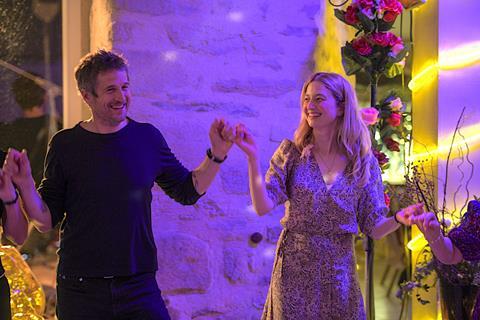Stéphane Brizé changes register for this romance starring Guillaume Canet and Alba Rohrwacher

Dir. Stéphane Brizé. France. 2023. 115 mins.
Best known these days for his acclaimed socio-political trilogy starring Vincent Lindon (The Measure of a Man, At War, Another World), French writer-director Stéphane Brizé reminds us of his versatility in the very different Out Of Season, a blithely emotive vehicle for Guillaume Canet and Alba Rohrwacher. This is a romantic comedy insofar as, by turns, it’s a comedy and a romance – the disjunction making for an enjoyably teasing proposition. Fresh stylistic invention on Brizé’s part, plus impeccable performances by two leads clicking nicely, will give this small-scale but rewarding item healthy niche appeal after its Venice premiere – both in France, where it wil release next spring, and anywhere that mature art-house viewers are happy to have their tearducts tweaked with intelligent expertise.
Proves that cinematic romances can be emotive without being kitsch
Brizé has previously worked in the modes of romantic comedy of a humorously dour sort (2005’s I’m Not Here to be Loved), and melancholic romance (Lindon and Sandrine Kiberlain vehicle Mademoiselle Chambon, 2009). In Out Of Season, he successfully melds the two. Set on the coastline of Brittany – and filmed around the town of Quiberon – the film begins with Mathieu (Guillaume Canet), a famous film actor, checking in at a vast, soulless spa hotel that offers chic seawater-based ‘thalassotherapy’.
Mathieu has come to escape from stress, but everything contrives to crank up his anxiety further – the impersonal massage machines, the endless selfies he’s asked for, an encounter with a volubly new-agey beach therapist (Hugo Dillon). We soon discover what’s eating Mathieu: in a fit of anxiety, he has walked out of his first stage role, a prestige production already massively pre-publicised (as seen in a nice mock-up of a Paris Match photospread). The director is leaving him phone messages that takes guilt-tripping to a new level, while Mathieu’s wife, a high-profile news anchor (voiced on the phone by the film’s co-writer, real-life TV journalist Marie Drucker), is way too busy to show much empathy.
A smile finally breaks on Mathieu’s tense features when he receives a message from an old flame who lives locally and wants to meet. She is Alice (Alba Rohwacher), who knew him in Paris before his success; married to a doctor and local councillor (Sharif Andoura), she works at a retirement home while maintaining her creative life at the piano. As soon as she and Mathieu sit down over a meal, they show an easy chemistry, clearly delighted to see each other – but as his sojourn brings them closer, unresolved issues bubble to the surface.
For both parties, the other is the one that got away – or at least, the one that gets them both thinking about paths not taken, and destined outcomes that perhaps weren’t really destined after all. As the film develops, so do its style and its emotional register. Much of the film is executed primarily in with crisp comic detachment, with Brizé using greater stylisation than in previous films: carefully framed sight gags such as Mathieu glumly manipulating an automatic door, a slow-burn routine with a hi-tech but utterly useless coffee machine.
This is one of those films that contain a certain moment at which you can’t help feeling that if it ended precisely there, the narrative would be perfect. There’s a certain biting point of poignancy that Brizé nevertheless chooses to go beyond, providing a final act that, against expectations, intensifies the register and makes you forget that it all started out with clipped comedy. The more expansive romantic mode Brizé shifts into even has a touch of Claude Lelouch (without the exorbitant lushness), and nicely supplements the earlier echoes of Lost In Translation (Mathieu contending with his pampered ennui).
There’s a joyous, quasi-documentary sequence at the retirement home, featuring a host of elderly non-professionals and a droll duo of bird imitators. In such moments, Brizé may seem to be making a routine point about everyday human rapport being superior to the life of polished illusions led by Mathieu and his wife. But overall, he’s working along more nuanced and sometimes troubling lines, as we see when Alice unburdens herself to Mathieu after a 16-year wait.
Such a film - essentially a two-hander - totally relies on the chemistry of its leads, and the gentle, tentative interplay between Canet and Rohrwacher gels beautifully. Canet comes across as much more likeable and relaxed than we’ve often seen him, while Rohrwacher adeptly suggests the weight of nostalgic regret underneath her character’s glow (in a dinner party sequence, Alice’s silent face economically indicates her isolation amid the communal bonhomie).
It could be argued that Out Of Season is just a touch over-extended and over-stated – but this would be to judge it by a rigorous art-cinema measure, and that’s not what the film is about. Out Of Season proves that cinematic romances can be emotive without being kitsch, and Antoine Heberlé’s photography keeps the feeling expertly framed – pitching the antiseptic enclosure of the spa against the windblown coastal setting, by turns austerely beautiful and just plain drab.
Production company: Gaumont
International sales: Gaumont, alexis.cassanet@gaumont.com
Producer: Sidonie Dumas
Screenplay: Stéphane Brizé, Marie Drucker
Cinematography: Antoine Heberlé
Editing: Anne Klotz
Production design: Mathieu Menut
Music: Vincent Delerm
Main cast: Alba Rohrwacher, Guillaume Canet, Sharif Andoura, Lucette Beudin

























No comments yet